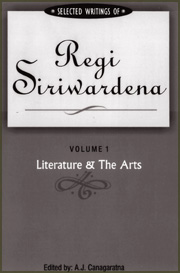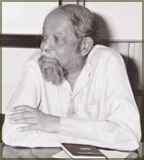|
DAILY NEWS ONLINE |
|
|
|
OTHER EDITIONS |
|
|
|
|
|
|
|
|
|
OTHER LINKS |
|
|
|
|
|
|
 |
|
|
|
This 851 page volume presents Regi Siriwardena's articles on literature and reviews of films, books and theatre during the 11 years he worked at Lake House in the 1950s.
They also include articles published in the "Lanka Guardian" and journals like "Community," "Thatched Patio" and "Nethra." Given below the foreword of the book by Radhika Coomaraswamy.
Your body, battered
by water, consumed by fire,
Rises as smoke in the air.
A mercy it won't lie
mouldering in the long
corruption of earth's kiss.
That in one year three
friends should die
Is the measure of life's
insanity Please, no more
a voice inside me cries
over the flame's roar.
-Regi Siriwardena, At Richard's Funeral
Regi Siriwardena, poet, political activist, linguist, scholar, critic, author, scriptwriter, fabric designer, artist, political commentator, social activist and friend is no more. One cannot analyse the political and creative intellectual currents of twentieth century Sri Lanka without giving him a central role.

In many ways he signified the creative imagination of Sri Lanka for much of the latter half of the twentieth century, an imagination, rooted in the national but universal in aspiration; an imagination that was openly political but also deeply spiritual.
Regi Siriwardena was one of a special generation of Sri Lankans who were created during the encounter with colonialism.
In his poem "Colonial Cameo", he speaks of a father who made him read Macaulay and admire Napoleon and a mother who only spoke Sinhala. He remembers the day she took him to school and leaving she said "Gihing Enang" to a peal of giggles from his classmates. Regi writes:-
My mother pretended not
to hear that insult.
The snobbish little bastards!
But how can I blame
them? That day I was
deeply ashamed of my mother.
Now, whenever I remember,
I am ashamed of my shame.
-Regi Siriwardena, Colonial Cameo
Regi, like the great nationalist heroes of his era, was caught between the horizons set by their westernized fathers and the emotional attachment to their eastern, spiritual mothers. This tension was the source of a great deal of creativity.
Regi was part of that bilingual generation that was equally at home (and not at home) with Shakespeare and the poetry of Parakrama Kodituwakku.
Their knowledge of English gave them access to world literature, to Marx, to Akhmatova, to Pablo Neruda and to Tolstoy. Their attachment to the Sinhala mother tongue made them pioneers in modern Sinhala prose and poetry.
This creative tension, present in Martin Wickremesinghe, Saratchchandra, Tissa Abeysekere and other great cultural figures of the south of Sri Lanka and in the work of people like Professor Kailasapathy in the North of Sri Lanka, produced some of the best literature and creative work Sri Lanka has ever seen.
Searching for the authentic self, they enriched the local imagination. Tormented by national humiliation but aspiring to universal truths, this "colonial" generation resurrected national self-respect and yearning.
However, the nationalist cultural revival that inspired Regi in the 40s and 50s was always tempered and conditioned by the intellectual traditions of Marxism.
Regi had no time for sentimental ethnic attachments that result in an excess of nationalist and ethnic chauvinism. He was anti-imperialist and he was for the poor and the underprivileged. They were always his first priority.
Regi was a pioneer in the South against ethnic chauvinism and majoritarianism. He was often attacked and mauled in the press for his brave stands against ethnic chauvinism. He did not hesitate to attack sacred cows and he was brave and unrelenting in his assertions.
In many ways Regi represented the best in a Marxist, Trotskyist tradition. He inherited the internationalism and the global reach of the intellect that guided the early Trotsky and he developed a critical intellectual tradition that was deeply suspicious of structures of power and privilege, always subjecting them to close examination.
In the 40s, 50s, and 60s Regi was convinced that Marxism was the correct alternative for Sri Lanka and so were the best sensitive minds of that generation.
Later on Regi began to be critical of Marxist sacred cows for despite his ideological leanings, he always believed in confronting and criticizing falsehoods and untruths. I was with him when he heard news about Gorbachev and he was greatly moved. He wrote
Now a liberal Tsar reigns
in the Kremlin
And the fair Raisa dispenses
both charm
And the Cultural Fund
bounties. Pray
With us that perestroika
may come to no harm.
-Regi Siriwardena, To Pushkin: A 150th Anniversary Letter
He was a fiery polemicist, never mincing his words, and he ripped into people, Stalinists, ethnic chauvinists, teachers of English, with equal fervour. He hated hypocrites and fools and stripped away social pretensions. He was motivated by a desire for social justice and never compromised his principles.
His years underground and his attachment to left politics made him adopt an ascetic lifestyle. Till the day he died he never possessed a suit, the pompous artifact of colonized generations. He lived simply. His only luxuries were his books and his music.
This principled, ascetic lifestyle as a role model for young people is no longer as fashionable as it used to be. Regi was an ascetic to the end, a manifestation of his identification with the marginalized and the oppressed and a symbol of his spiritual disdain for material attachments. And yet, like good wine, Regi mellowed with age.
In his poem "The Wisdom of Age" he recounts how he has moved away from port, Donne, Yeats, and Beethoven to a dry martini, Frost, Pushkin and Bach. He never gave up his principles but he softened to others and began to enjoy close friendships.
Is this the fruit of experience?
Declining years? Maturity?
Wisdom? Or blood run cold
Who is to say? Not me
Despite his insightful political tracts, Regi will be remembered as the greatest literary and artistic critic that Sri Lanka has ever produced. He will be remembered for his literary and creative imagination. Regi was a self taught linguist who was fluent in seven languages.
His translations of the work of Anna Akhmatova have an international reputation. He also wrote poetry and novels. He was a foremost critic and every author, poet, artist or film maker lived in dread of his analysis as he was deeply influential and conditioned the way the public regarded important works of art.
He was also a lover of music, spending hours taping and recording cassettes for close friends of important works of classical music and jazz. He worked with Ena De Silva and Lucky Senanayake in resurrecting local cottage industries and local handicraft.
He was a pioneer in this field and every time we look at a batik we should remember both Ena and Regi for bringing back these age old traditions. His artistic sensibility was so respected that no one dared disagree with his views. When Regi made an artistic pronouncement, it was the ultimate word.
Regi's love of the arts, never took away from his essentially scientific temperament. In his youth Regi was regarded as a mathematical genius. Despite his disdain for colonialism, Regi was a child of the Enlightenment and had very little time for the antirational, moral vacuum of post modernism.
He had his sharpest words for this newer and younger generation. Regi was an amateur astronomist and he loved playing chess, especially with the computer since human beings were too fallible. He always felt that his love for music was linked to his love for mathematics, that science and music were closely linked.
Regi hated superstition, religion and irrationality. He believed in science, progress and dialectical materialism. He felt that mankind was always moving forward and that science and reason were keys to that progress. His desire to resurrect native traditions was never at the expense of losing sight of the important role of science.
It was Regi who cajoled me to buy the first computer for ICES in the 1980s and when I became a specialist in word processing he was delighted. He mastered the computer, the hardware and the software, in no time and taught everyone how to access modern technology.
For all of us left behind, Regi will always be remembered as the great mentor. Regi was a truly extraordinary teacher. He would sit patiently for hours and teach young people.
He would engage them, discuss issues with them, provoke them and cajole them into thinking differently, into asking the important questions and finding innovative answers. He made all of us question the world as we found it. He taught us how to see joy and beauty in simple things.
He would describe the stars and on office trips, he would recite poetry at the edge of reservoirs and lakes. He would intellectually challenge our political assumptions and show disdain for our slackness of mind. We would vie to spend time with him.
Regi Siriwardena and Dr. Neelan Tiruchelvam made ICES a special place where the best minds discarded old truths and searched for new answers together. So we grieve, but will never forget.
And that heart will
no longer answer
My voice in rejoicing
and grieving
All's over...And into the
empty night,
Where you are no more,
my song will go sounding.
-Regi Siriwardena translating Anna Akhmatova
|
|
 |
 |
 |
 |

